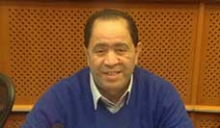Trade unions and civil society make a critical assessment of the EU Neighborhood Policy

In the aftermath of the 2012 popular uprisings, the EU offered its Southern Mediterranean partner countries “A partnership for democracy and shared prosperity” in the context of the revised European Neighborhood Policy (ENP) that focused on democratic transformation, a partnership with people and civil society, and sustainable and inclusive growth. During the day, an open and frank debate on the relations between the EU and the MENA region took place, evaluating changes that occurred in the two years since the Arab spring, with the participation of Arab and European civil society, EU parliamentarians and the EU Commission (DG Trade).
One of the EU’s policy strategies towards the Southern Mediterranean is the creation of a deepened Euro-Med Free Trade Area that aims at removing trade barriers between both shores of the Mediterranean. To that end, under the Deauville Partnership, the European Council agreed to negotiate Deep and Comprehensive Free Trade Agreements (DCFTAs) with four Arab countries in transition – Egypt, Jordan, Morocco and Tunisia- as a tool for economic growth and investment attraction in the Southern Mediterranean region. The discussion focused on trade, investment and the role of the private sector, tax policies as a tool of redistribution, and inequalities arising from trade and investment agreements.
Mr Malaoui drew attention to the fact that large parts of the economy in Algeria and the MENA region are informal. This has a direct impact on the labour rights of workers, but also on the incapacity of the state to collect taxes and redistribute them. Between 40 to 60% of tax revenue in the MENA region is generated by indirect taxes, which further deepens already existing inequalities. At the same time, tax evasion and avoidance have a huge impact on funding available for job creation and public services. Since the Arab spring, the Algerian government has clamped down on civil society and attacks on autonomous trade unions continue, as well as regressive legal reforms that further deteriorate human, social and labour rights. Mr Malaoui warned that unless priority is given to human and social rights, the situation in Algeria could become explosive once again.
Representatives from civil society from Palestine and Jordan were also very critical of free trade agreements that do not benefit local economies, but rather large foreign companies. Furthermore, serious doubts were expressed with regard to the potential impact of further economic cooperation with the EU, considering the highly volatile social climate in many Arab countries. Hundreds of strikes a year are being suppressed by governments, very high unemployment and underemployment are symptoms of economies with negative trade balances and hardly any national production. They stressed that current trade flows do not lead to inclusive growth, nor to more and decent employment.
NGO Bankwatch pointed out that the bulk of investments by the EBRD and other EU funding instruments go to energy, transport and natural resources, not to supporting the development of the local economy. The discretionary power of the top management in the banks is massive and heavily influenced by the interests of EU companies and opens opportunities for corruption. More transparency, rule of law and involvement of local actors is needed. The dangers of the ISDS (Investor-state dispute settlement) were discussed in terms of having a chilling effect on human rights in the region and the policy options of governments.
Ms Elly Schlein, of the Social and Democratic Group (S&D) of the European parliament, mentioned the importance of the post-2015 Development Agenda that will provide a framework for the whole world beyond trade interests and creates a new paradigm that applies to developed and developing nations alike. She also raised the importance of tax justice in the MENA region, as well as need for the EU to address the lack of respect of human and labour rights in the region. Mr Enrique Guerrero-Salom (S&D) spoke about the need to create a Mediterranean Development Bank to support investment in public services and goods.
Although it was recognized that the EU pursues its economic interests through trade agreements, there is a clear divide between the progressive groups in the European parliament and the position expressed by the European Commission. A turnaround of EU policies is needed that puts social development and fighting inequality, a new migration strategy and deepened cultural cooperation on the forefront.
In the afternoon another session addressed the social impact of the Neighborhood policy. The series of meetings, organized by SOLIDAR, concluded with a day of discussions and strategic planning with EU and MENA civil society organizations on 11th December.

